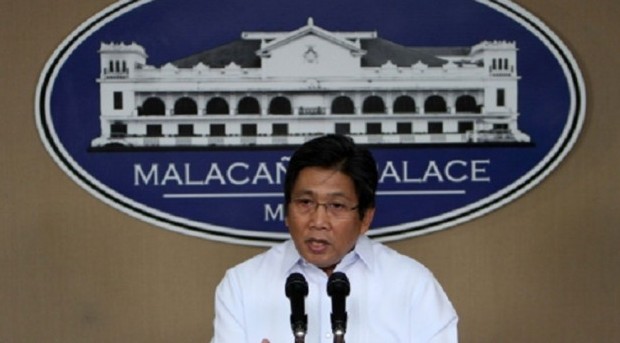MANILA, Philippines–Malacañang is willing to work with Sen. Grace Poe in addressing hunger and malnutrition problems, especially among children.
“According to Secretary Dinky Soliman, the DSWD (Department of Social Welfare and Development) is prepared to work with Senator Poe’s office in prioritizing areas verified to have high rates of malnutrition among children,” Communications Secretary Herminio Coloma said in a text message.
“We would like to continue working with Congress in giving poverty reduction and social protection (which includes the fight against malnutrition) the highest priority in resource allocation, as already embodied in the proposed 2015 national budget,” Coloma added.
In a privilege speech on Monday, Poe said a big number of Filipinos, including children, remained hungry or malnourished although the Philippine economy continued to expand.
Poe called for an increase in the 2015 budget for children’s feeding program by doing away with “frivolous” budgetary items.
Sen. Ralph Recto on Tuesday identified the overhead expenses for the government’s conditional cash transfer (CCT) program for 2015 as one source of funds that could be rechanneled to expand government feeding programs, amid the rising number of hungry Filipinos.
Recto said part of the P7.6-billion administrative cost of the Pantawid Pamilyang Pilipino Program (4Ps) for 2015, up from P5 billion in 2014, could be reduced and the funds allocated to feed starving children.
The budget for the program is under the DSWD.
Payroll, monitoring
Recto noted that the administrative costs included personnel payroll of P3.35 billion, monitoring cost of P429 million, and publicity and information cost of P115 million.
He said he would check the justifications for these amounts, some of which constituted “hefty” increases.
“Is the almost 185-percent increase in the publicity budget really necessary? Why are we increasing the payroll by P1.4 billion? Why are we doubling the allocation for monitoring to P430 million?” he said.
He also wondered why, if the cash grant to poor Filipinos would remain at P57 billion for next year, the administrative expenses would increase by P2.6 billion.
Recto, chair of the Senate finance subcommittee reviewing the DSWD budget, said that if the administrative costs for the CCT program would be retained at the 2015 level, there would be P2.6 billion that could be allocated for supplemental feeding.
“We’re done with the hearings. I am now drafting my subcommittee report. I will recommend some internal adjustments in the DSWD budget,” he said in a statement.
Daycare pupils
Recto said that once he had identified the funds that could be realigned, he would recommend that these be moved to the feeding program for daycare pupils.
The DSWD’s feeding program consists of serving one hot meal a day for 120 days to over 2 million children in daycare centers or under supervised neighborhood play.
Recto said the Senate could increase the P14 per meal budget or increase the number of beneficiaries.
He also said the supplemental feeding program could be included in other under-funded DSWD programs, such as the street children program that targets only 3,000 kids.
He also noted that the DSWD budget for 2015 would rise to P109 billion, a P25.5-billion increase from its 2014 allocation, It is in the top 5 of the biggest recipients of allocations from the national government.
The bulk of the budget is for the CCT program.
Child Nutrition Act
In the House of Representatives, Bayan Muna Rep. Neri Colmenares said his group shared Poe’s view that child hunger was one of the country’s most pressing problems.
Colmenares said Bayan Muna had filed the proposed “Child Nutrition Act” as an alternative to the CCT program to ensure that all elementary and high school students would have access to nutritious food.
“The Aquino administration must allot more funds for this rather than to debt servicing, DAP (Disbursement Acceleration Program) or pork barrel. The problem of hunger can be solved in the long term by implementing genuine agrarian reform, modernizing agriculture and nationalizing industrialization,” said Colmenares.
Ako Bicol Rep. Rodel Batocabe said that the government’s 4Ps program had fallen short of being the panacea to poverty and hunger.
“The 2015 budget actually is geared toward achieving inclusive growth but as always, we always fail in the implementation of the program. I believe what is needed is to enhance the absorptive capacity of the agencies, ensure transparency and accountability of public funds, strengthen public spending in the countryside, institutionalize disaster preparedness and response, and enhance the capacities of our institutions to deliver social services to our people especially in the rural areas,” said Batocabe.
He said plugging these loopholes or leakages in the delivery of social services would ensure that progress would trickle down to the masses.
Quezon City Rep. Winston Castelo said House leaders were crafting a bill creating a National Food Assistance Office, which would get P20 billion in seed money from the Philippine Amusement and Gaming Corp. and the Philippine Charity Sweepstakes Office.
“The rationalization of their budget could provide concrete food programs to reverse the situation. The private sector should also be tapped by providing them tax credits or subsidies on any food programs their companies could initiate. The new office, if approved, should be under the Office of the President and can source out other allocations to implement various projects in arresting this socioeconomic problem,” Castelo said.
RELATED STORIES
Child malnutrition still high—report
Feeding program tops Grace Poe’s priority bills
